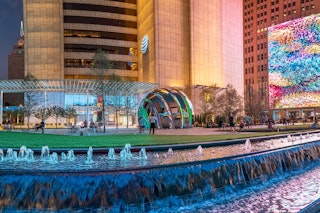Remembering Dallas LGBTQ+ Legacy Is Fundamental
Take a look back at how Dallas has built the largest Rainbow community in Texas.
Dallas is home to the 6th largest LGBTQ+ populations in the country and the largest in Texas. The Strip on Cedar Springs is the main LGBTQ+ entertainment district in the Oak Lawn neighborhood, so you’ll often hear the area called either Oak Lawn, Cedar Springs, The Crossroads or the “gayborhood” by locals. Just know they’re all referring to the same place. Visitors to the community now enjoy a safe space to have brunch with friends at spots like Roy G’s or Hunky's, dance in clubs and bars such as Round-Up Saloon or Sue Ellen's, and of course, celebrate Dallas Pride every year in June at Fair Park and the newly launched Pride in Dallas each September in the heart of the gayborhood. But anyone who travels to this queer haven should know the hard-fought history that made it possible for the community to prosper.
Just three years after the riots at Stonewall shed light on the discrimination of the LGBTQ+ community, Dallas' own LGBTQ+ citizens gathered in a crowd of about 300 to march through Downtown proudly proclaiming that the community was prepared to fight for equal rights. The 1972 Dallas Pride Parade was nothing elaborate by today's standards but it set up the foundation for more than 50 years of progress in Dallas for the LGBTQ+ community.


The next Dallas Pride parade didn't happen until 1980 and was successfully pieced together by business owners and community members in Oak Lawn/Cedar Springs. Two years later, the Dallas Tavern Guild was established and took over the organization and production of the parade, which has become a landmark event in Dallas.
From 1983 to 2018, the Parade was held in September to commemorate Judge Jerry Buchmeyer’s ruling in the Baker v. Wade case, a ruling which struck down Texas' sodomy law until it was later overturned. Our current parade gets its name from the former executive director of the Dallas Tavern Guild, Alan Ross, who for many years had the greatest impact on the success of Pride celebrations in Dallas. Since 1991, the parade has been called the Alan Ross Texas Freedom Parade in his honor and in 2019 it was relocated to Fair Park, home of the State Fair of Texas, and moved to June, LGBTQ+ Pride Month.

In 2018, Dallas also became the first city in Texas to be officially recognized for its gay and lesbian neighborhood in Oak Lawn. The Texas Historical Commission recognized the history of this neighborhood as being a place of community gathering marking the corner of Cedar Springs Road and Throckmorton Street with a plaque that will stand as a marker for decades to come.

Today, Dallas celebrates our LGBTQ+ community throughout the year with a varied collection of events and programming. We're home to Black Tie Dinner, the largest annual LGBTQ seated dinner fundraising event in the world. Our performing arts community enjoys the hard work and dedication of the Turtle Creek Chorale, the most-recorded male chorus in the world, and Uptown Players, a theatre company focused on presenting LGBTQ+ stories. And because everything is bigger in Texas, we're even home to the largest predominantly LGBTQ+ church in the world, The Cathedral of Hope. DIFFA Dallas, the largest fundraising event in Texas supporting the fight against HIV/AIDS, and the first Rainbow LULAC chapter also call Dallas home.
The City of Dallas has comprehensive ordinances offering lesbian, gay, bisexual, and transgender residents protection from discrimination in employment, housing, and other public areas. Dallas has more rainbow crosswalks than any city in America. Dallas was also the first, and is still the only, city in America that has an official PRIDE version of their City flag, which flies over City Hall for the entire month, every June.

In addition to Dallas Pride at Fair Park each June, a new group has launched Pride in Dallas to bring an event back to the gayborhood during September. The city also hosts multiple celebrations throughout the year to highlight specific groups within our larger queer community such as Dallas Southern Pride, an annual celebration for Black LGBTQ+ people, and Texas Latino Pride.

Of course, we will continue to work as a city to add to this often hard-fought history and make Dallas a shining example of inclusivity and equality for everyone under the rainbow.








